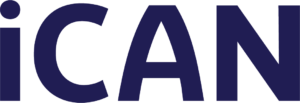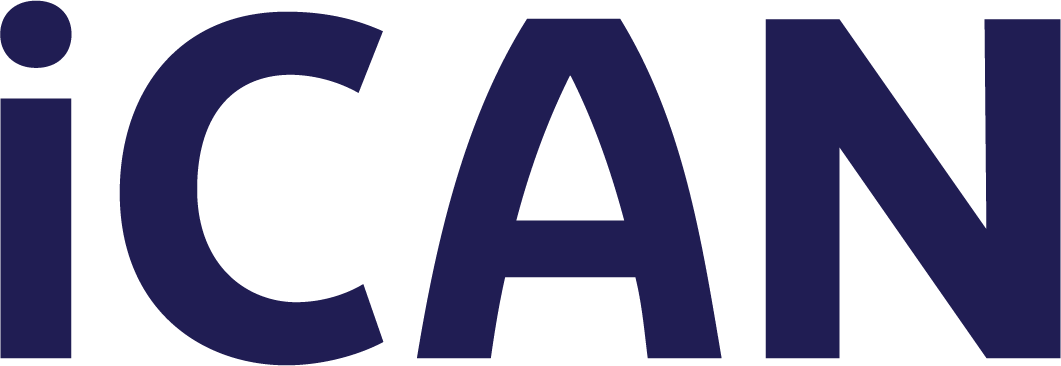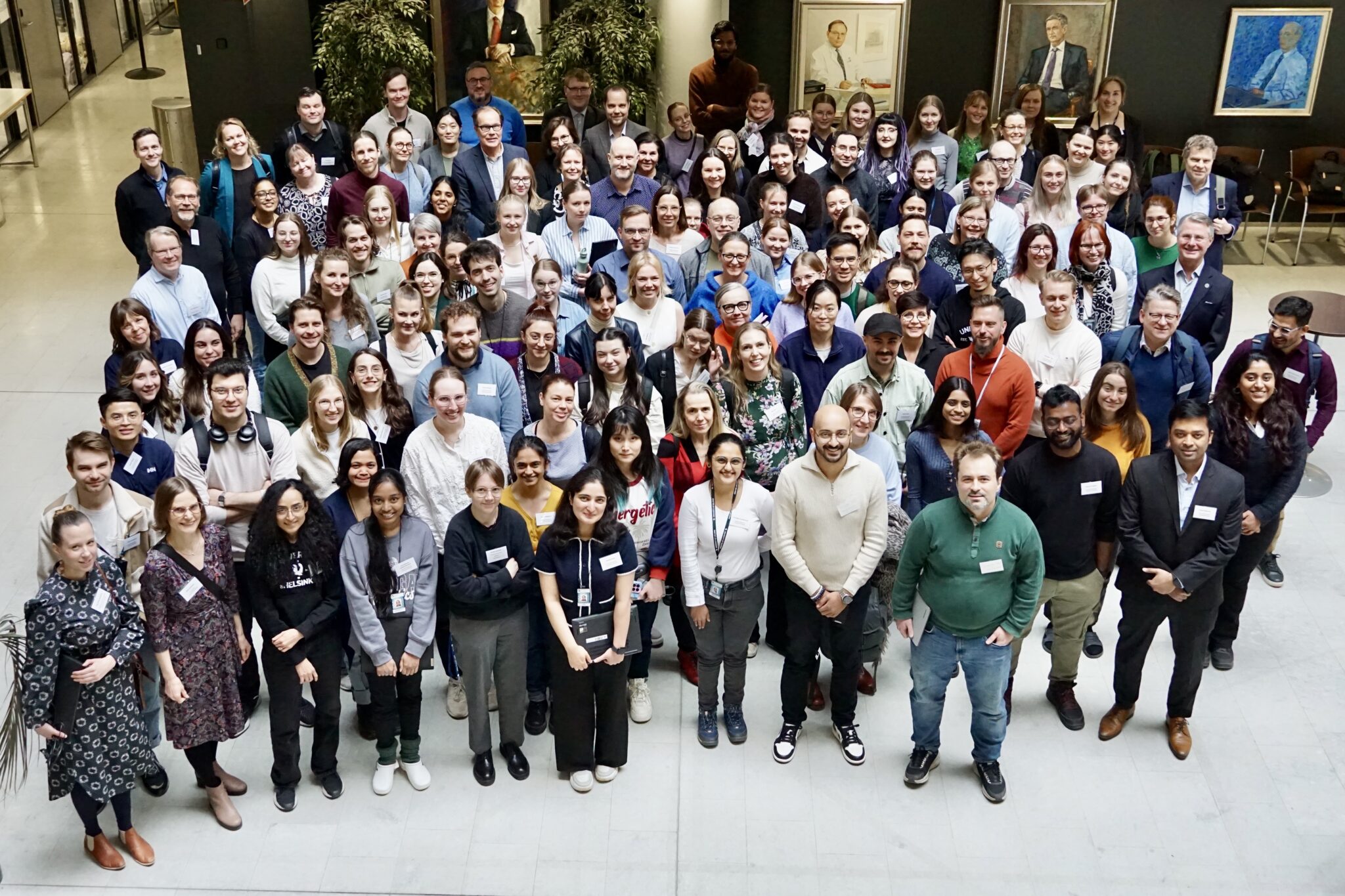iCANDOC national get-together: Fostering collaboration among doctoral researchers
The first-ever iCANDOC national get-together gathered doctoral researchers and their supervisors from all five participating universities. The event provided an opportunity to network, exchange ideas, and gain insights into the diverse research projects within the pilot program. A group of 160 attendees spent the afternoon engaging in short three-minute presentations and lively discussions during the poster session.
At the University of Helsinki, iCANDOC has garnered significant attention as the largest pilot cohort, with 122 doctoral researchers. In contrast, cohorts at the universities of Turku, Tampere, Oulu and Eastern Finland are smaller, with 5–10 students. Many doctoral researchers especially from the smaller cohorts emphasized how valuable it was to gain an overview of the ongoing projects in the pilot, reinforcing the importance of cross-university collaboration.
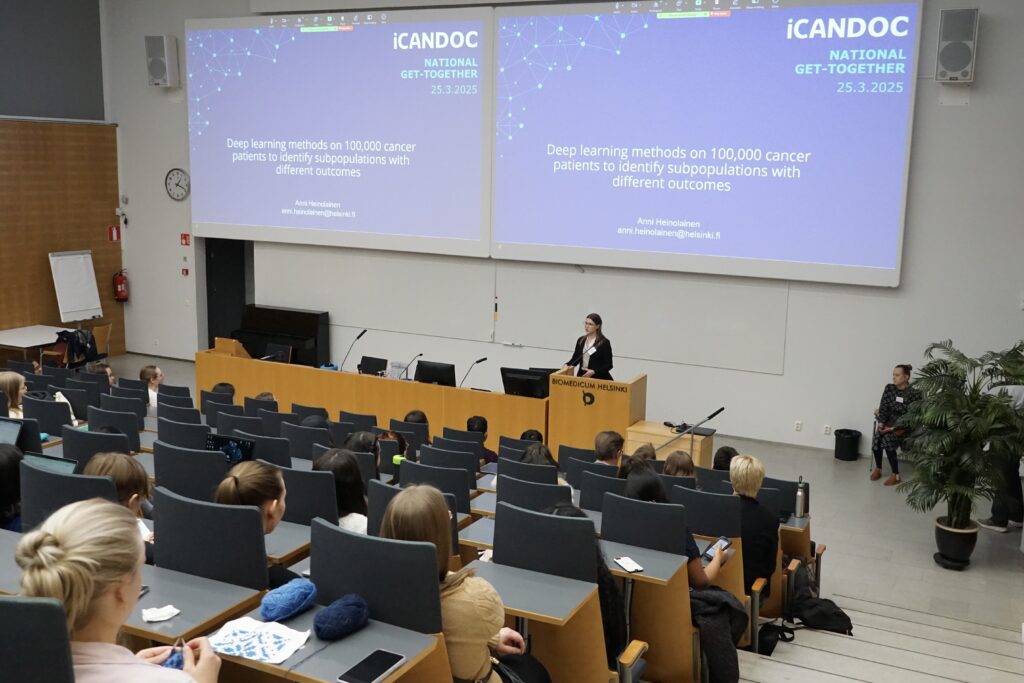
In addition to three-minute teaser talks, Aparna Ganesan, a doctoral researcher in the iCANDOC, University of Helsinki, had a 10- minute presentation on her first article. Piia-Riitta Karhemo, the iCANDOC Scientific Coordinator congratulated the speakers: “Communicating their research project in just three minutes challenged the doctoral researchers in defining a clear message on the aims and significance of their research. Well done, everybody!”
Career Paths in Industry: Insights from Kirsi Saukkonen
One of the key focuses of the iCANDOC initiative is to bridge the gap between academia and industry, fostering scientific expertise for private sector careers.
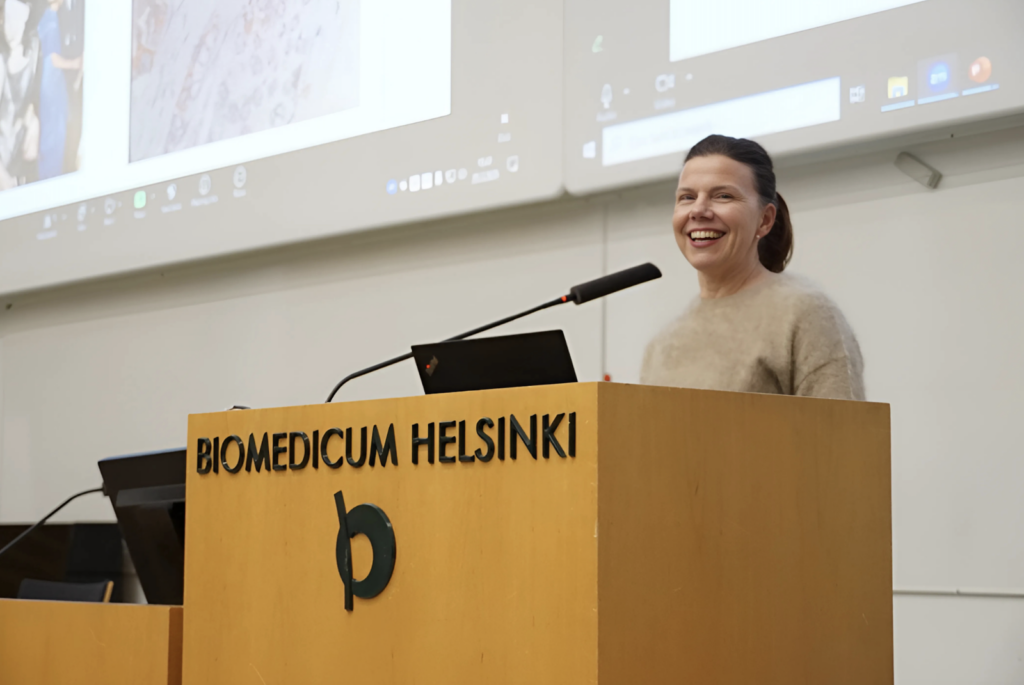
In her career path presentation, Kirsi Saukkonen (Amgen) provided an overview of career opportunities in the pharmaceutical industry. She emphasized the key competencies required to succeed in various roles, including health economics, regulatory knowledge, networking, scientific expertise, leadership skills, strategic thinking, presentation skills, cross-functional collaboration, clinical trial knowledge, project management, and communication skills (internal and external stakeholders).
Saukkonen advised doctoral researchers to focus on their research projects rather than accumulating certificates, as the PhD process itself cultivates many of these essential skills. She also highlighted the numerous programs within the pharmaceutical industry that support employees in further developing their expertise later on their careers, underlining the importance of a curious mindset.
Panel Discussion: Skills, Career Choices, and Innovation
A panel discussion facilitated by the iCANDOC Scientific Coordinator Piia-Riitta Karhemo, and featuring Tiina Vesterinen (Managing Director, Finnish Cancer Institute), Kirsi Saukkonen (Therapeutic Area Head, Amgen), Johanna Anttila (Postdoctoral Researcher, University of Helsinki), and Tomi Mäkelä (iCANDOC Director, University of Helsinki) covered a range of topics, from work-life balance and job security to personal career choices. The panel also discussed the essential skills needed in both academia and industry.
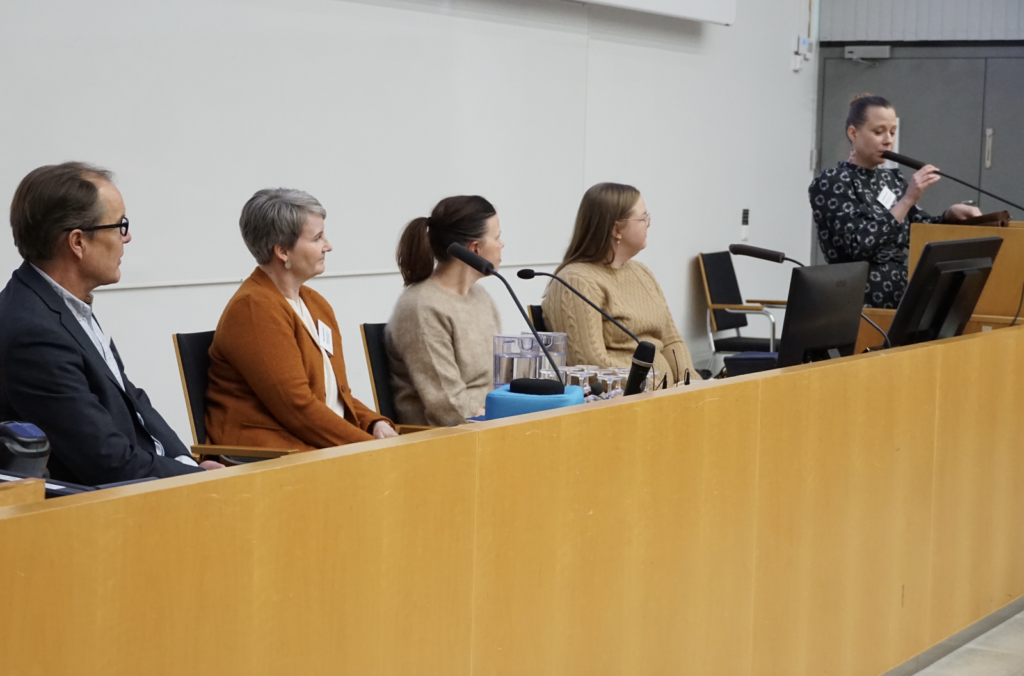
Discussion addressed a pre-submitted question from the audience about translating research into innovation. Tomi Mäkelä noted, “In the university setting, stepping beyond the mindset of ‘nothing but publications’ is crucial. Researchers should consider early on which aspects of their work could be transformed into innovations. However, even with available support, this requires strong personal motivation, and a distinct skill set.”
When asked guidance on how to manage the targeted three-year timeline for doctoral thesis , Johanna Anttila emphasized the importance of maintaining active dialogue with supervisors and thesis committee. The panelists also reminded doctoral researchers to focus on and enjoy the PhD journey rather than overly worrying about future career paths, as the experience itself is highly valuable.
Perspectives from Doctoral Researchers and Supervisors
Many iCANDOC doctoral researchers are building their iCANDOC projects on prior Master’s theses or projects that have started with other funding. Iida Salonen and Alvar Saarinen, who joined iCANDOC in the fall, noted that the ten-member cohort in Tampere has quickly formed a strong community, many of them having studied together. Iida highlighted the unique advantages of the pilot, particularly the security of three-year contracts and additional research resources. Alvar pointed out that participating in funding applications for other projects helps develop valuable grant-writing skills essential for academic careers.
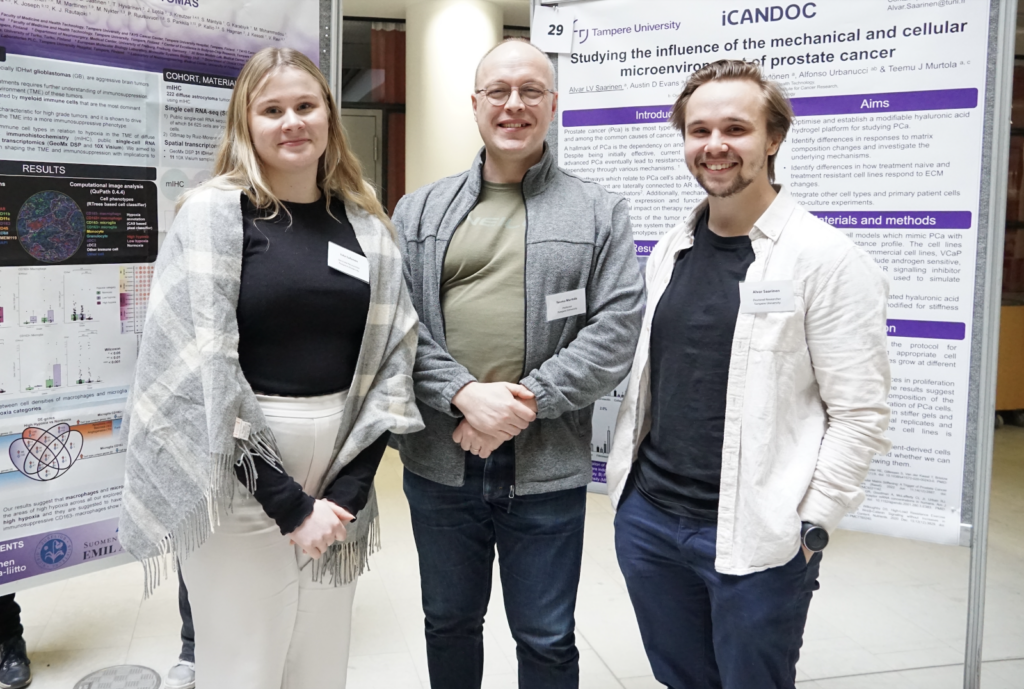 Iida Salonen, Teemu Murtola, and Alvar Saarinen
Iida Salonen, Teemu Murtola, and Alvar Saarinen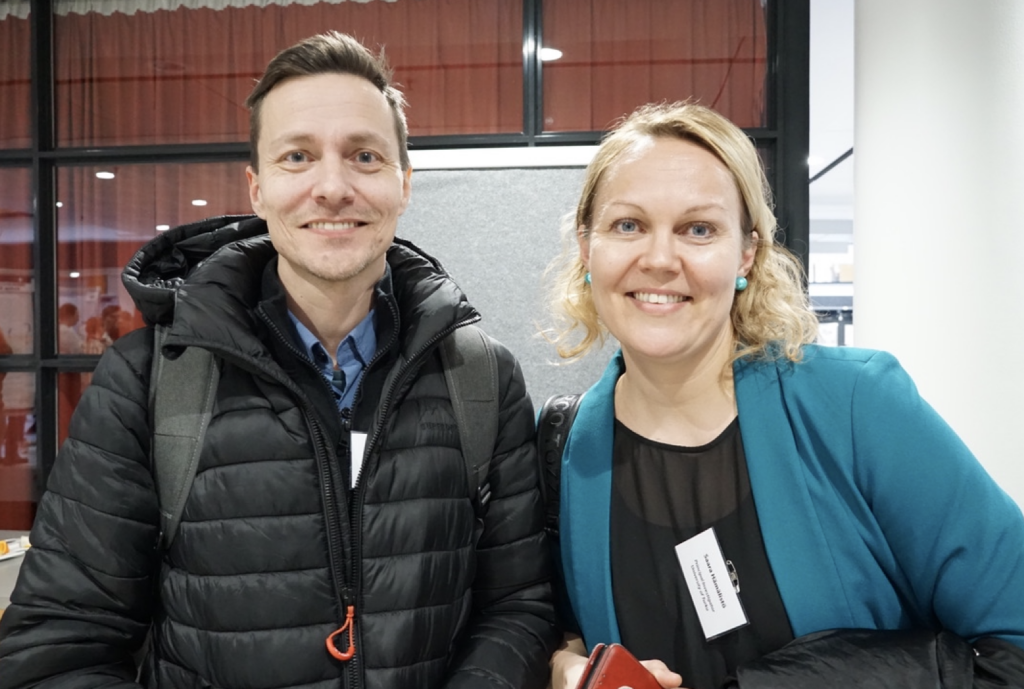 Janne Leivo and Saara Hämälistö
Janne Leivo and Saara Hämälistö
From a supervisor’s perspective, Teemu Murtola acknowledged the pilot’s benefits: “Supervision remains fundamentally the same, but the pilot provides great support for the research group. Of course, the three-year time-frame is tight, but as we discussed today, it forces researchers to focus on productive paths. External pressure can enhance efficiency.” Supervisor Saara Hämälistö from the University of Turku appreciates the structured nature of iCANDOC, saying that planning projects to fit within the time-frame required a different approach.
International Perspectives and Future Aspirations
For international researchers, starting in iCANDOC has come with both challenges and rewards. Akshatha Gowri Kalavathi Shivakumar, who began her PhD at the University of Eastern Finland in mid-September, shared her experience: “I’m new to Finland and started from scratch in a new lab, which has been a bit stressful. However, my PI and lab have been very supportive. These events are great—it’s important to hear from others and understand how their work is progressing.”
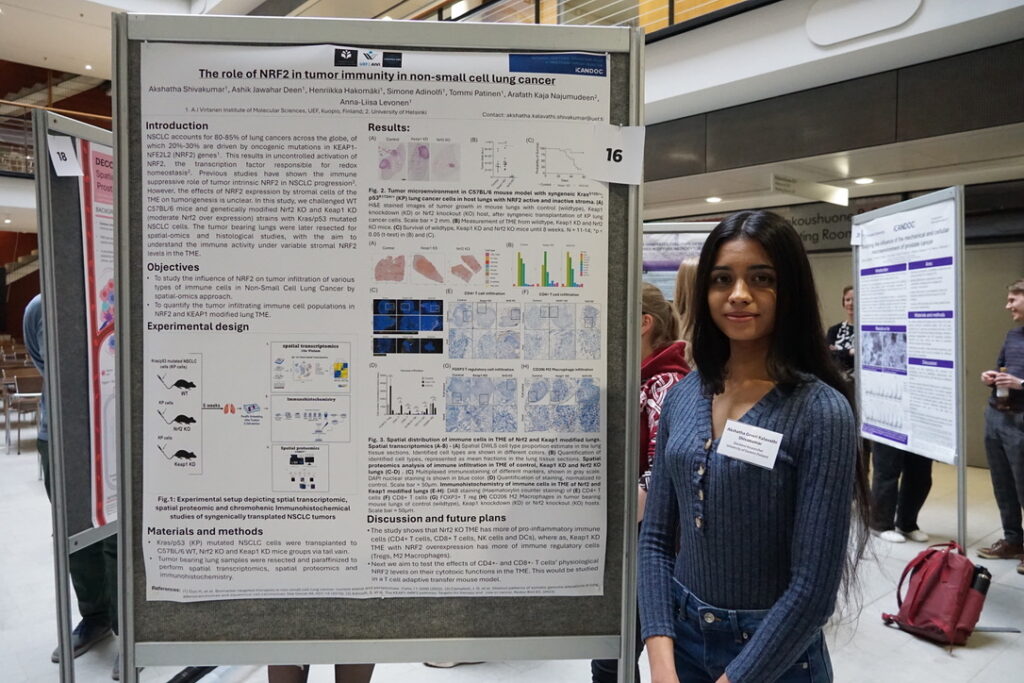 Akshatha Gowri Kalavathi Shivakumar
Akshatha Gowri Kalavathi Shivakumar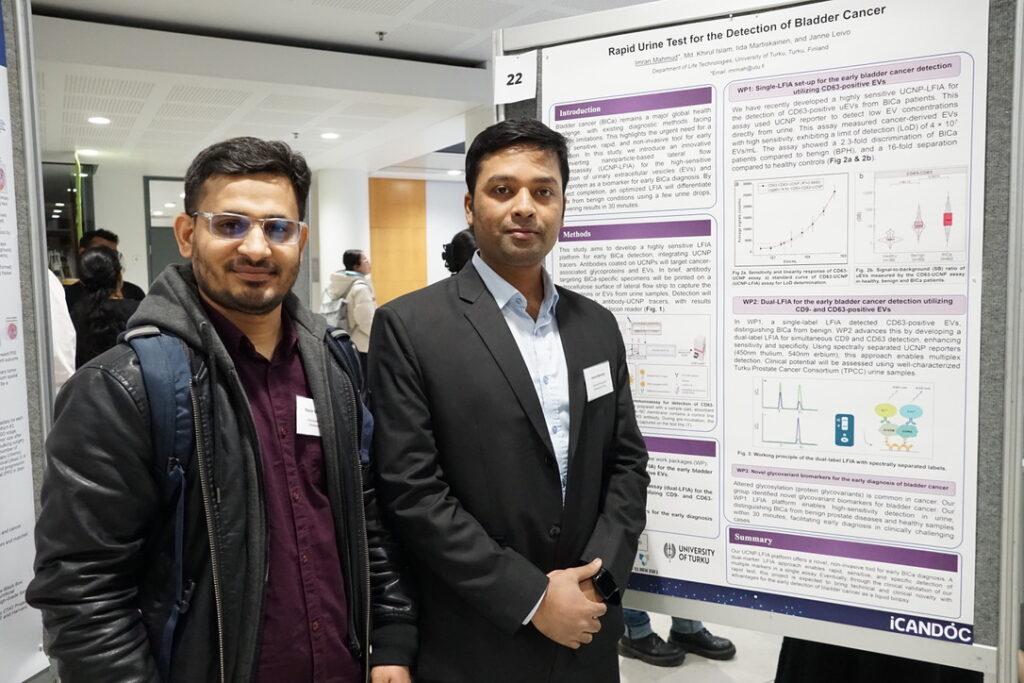 Md Nasir Uddin Badal and Imran Mahmud
Md Nasir Uddin Badal and Imran Mahmud
The University of Turku hosts ten iCANDOC doctoral researchers, including Imran Mahmud and Md Nasir Uddin Badal. Mahmud, who joined in August after four months in a graduate school, is happy with the program’s structure: “We have follow-up meetings every three to four months with our supervisors and committee members. The application process was very competitive, and I’m happy to be part of this initiative.” Nasir echoed the sentiment, also raising an important question: “What happens after the PhD? Will our degrees be valued as highly as those of researchers who took longer and gained more experience in the field?”
Congratulations to the winners
Last, but not least the best poster, best poster+teaser talk, and best teaser talk based on the votes of the participant were awarded to Sadegh Beikverdi (Functional and Structural Aspects of the RET Receptor Tyrosine Kinase in MEN2A Cancer Syndrome, Primary supervisor Adrian Goldman), Outi Hasu (Tumor microenvironment and tumor cell plasticity in prostate cancer: Uncovering Novel Biomarkers for Enhanced Patient Stratification, Primary Supervisor Teijo Pellinen), and Georgia Vasiliki Gkountana (Uncovering the immunosuppressive roles of IDO1 and oral microbiome in HNSCC, Primary supervisor Ahmed Al-Samadi). Congratulations!
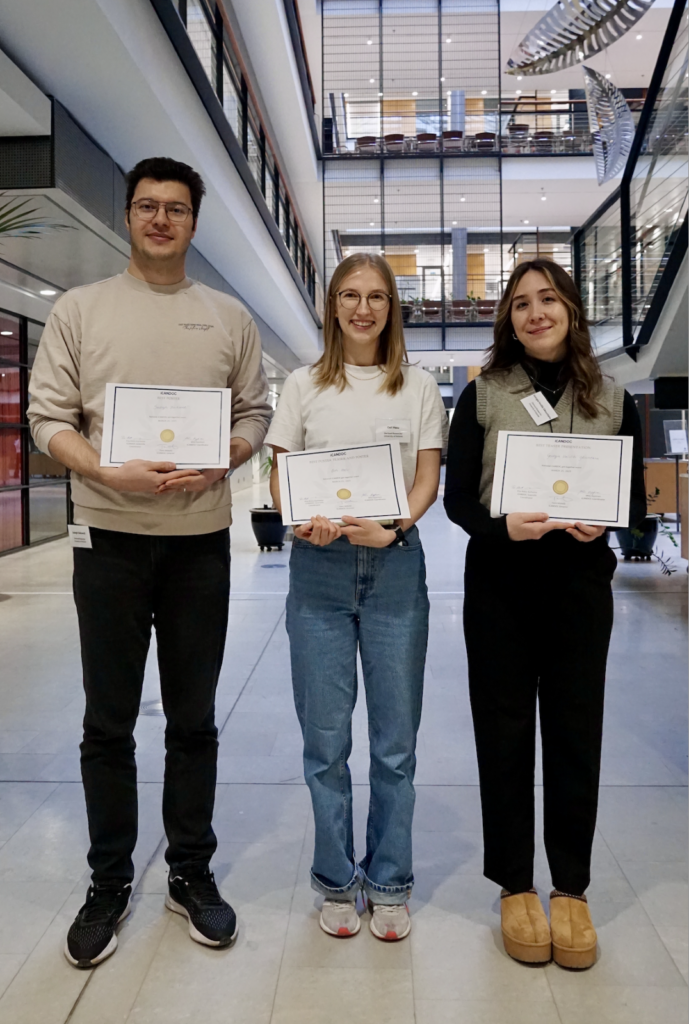 Sadegh Beikverdi, Outi Hasu, Georgia Vasiliki Gkountana
Sadegh Beikverdi, Outi Hasu, Georgia Vasiliki Gkountana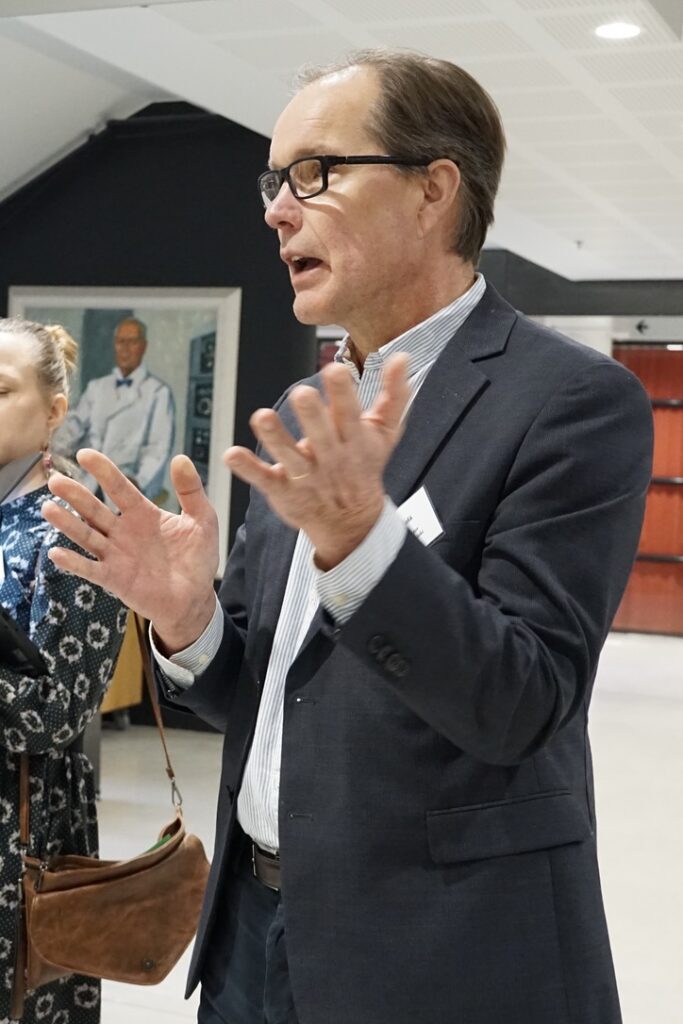 Tomi Mäkelä
Tomi Mäkelä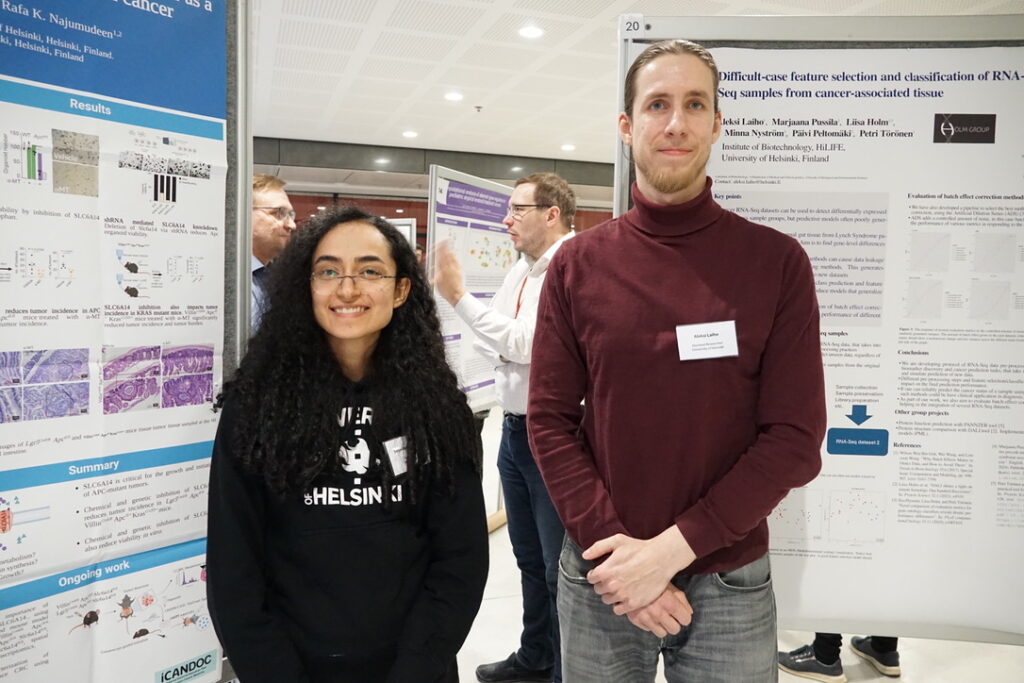 Seyedehshima Naddafi and Aleksi Laiho from the University of Helsinki
Seyedehshima Naddafi and Aleksi Laiho from the University of Helsinki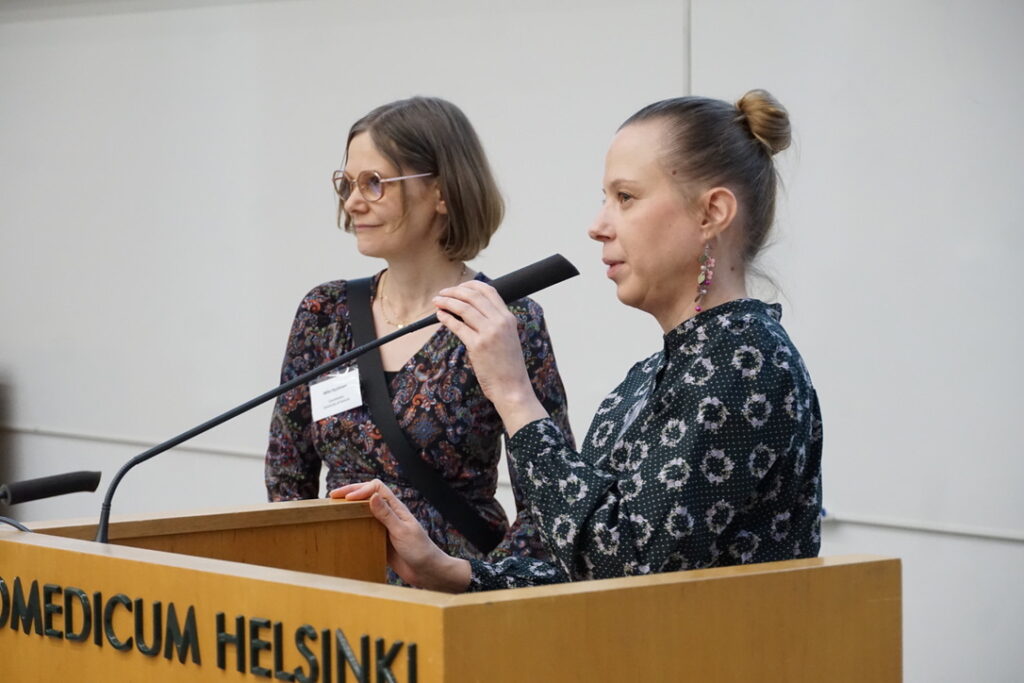 The organizers of the event: iCANDOC Coordinator Mila Hyytinen and Scientific Coordinator Piia-Riitta Karhemo
The organizers of the event: iCANDOC Coordinator Mila Hyytinen and Scientific Coordinator Piia-Riitta Karhemo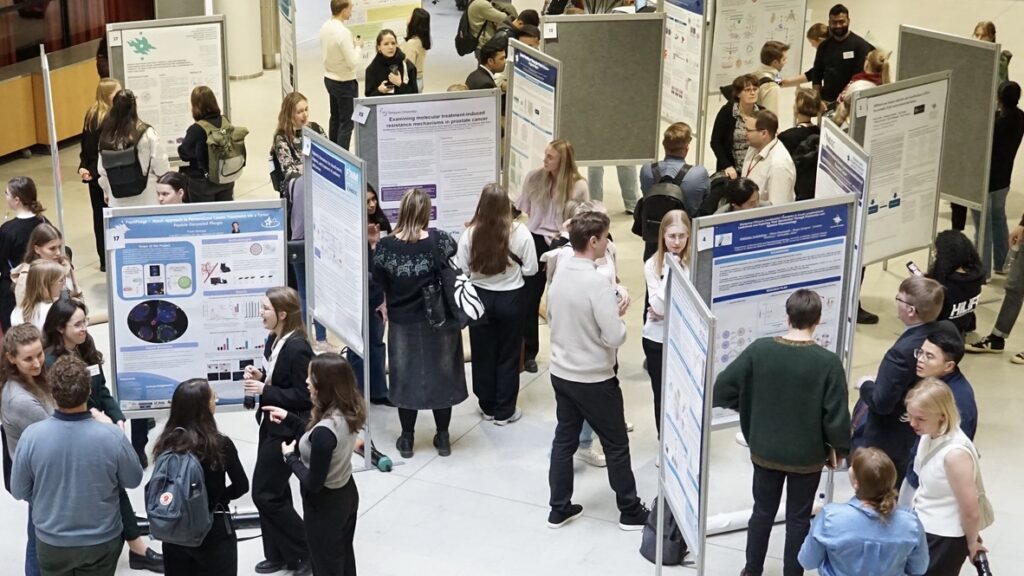 Poster session
Poster session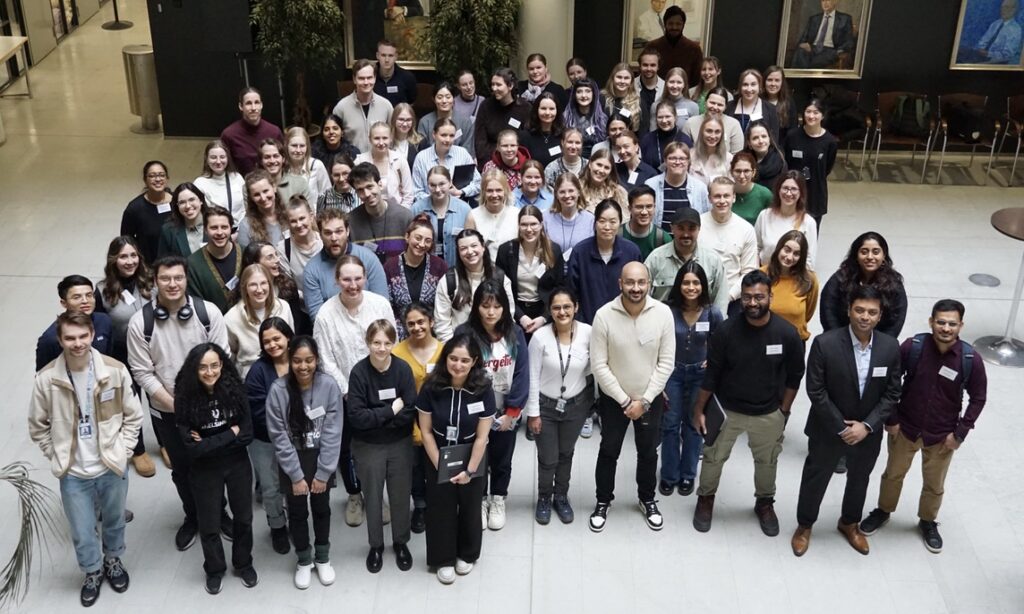 Doctoral researchers in a group photo
Doctoral researchers in a group photo
“Great general insight to the doctoral projects. Awesome panel discussion and talk by the Amgen representative. Got a lot of advice on which skill-sets to develop. Event was well organized, enough breaks and good structures for the talks. Very good and engaging poster session. 10+”
-Anonymous feedback
Thank you to all the participants. See you soon again, and in the meanwhile, keep focused and enjoy the journey!
